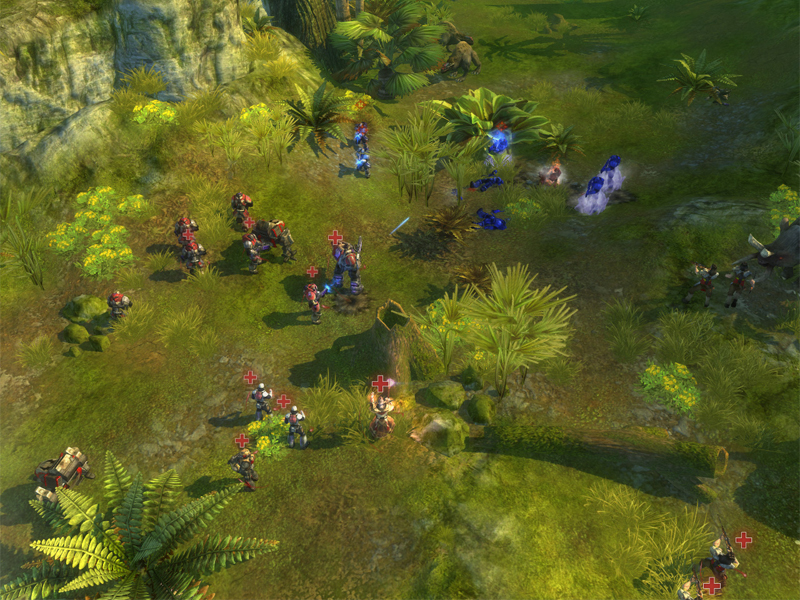WorldShift
BY James Day // December 9, 2009
RTS mediocrity mired with problems.
hat would you get if you hastily added the Warcraft, Starcraft, and Warhammer universes and a few sprinkles of an RPG to a blender?
Worldshift, that's what.
It's immediate from the opening cut scene and first five minutes of play that this world design is clearly derived from both of Games Workshop's science fiction and fantasy tabletop universes. Expect to find shoulder-plated space marines and elfin ladies in metal brassieres all with a mildly cartoony aesthetic that most will be familiar with from Blizzard's Warcraft franchise.

This world design is clearly derived from Games Workshop's tabletop universes.Its game play is also lifted from the real-time strategy-based Warcraft games, with a hero unit system accompanying the standard resource gathering and unit building. It does a competent job of this, but without any additional innovations and a forgettable single-player campaign, there isn't anything here that other RTS games haven't already done better.
Recently, the genre seems to be acknowledging its niche-status and has tried to cater to broader audiences. Brutal Legend attempted to create a console-friendly RTS experience by easing players in gently, while Red Alert 3 included a series of optional tutorial missions for beginners.
Sadly, Worldshift doesn't go to such lengths to pull in a wider audience. It's considerably old-school in this area, expecting you to read up in the manual to find out exactly what everything in the game does. If only it had a friendlier introduction through its campaign or even a separate tutorial mode it might have proved to be more accessible.
Multiplayer seems to be Worldshift's focus and this is where most of its merits lie. A variety of competitive and cooperative modes gives it probably the only leg-up it has over peers like Warcraft.

A competent job , but without any additional innovations.Its main innovation comes from the ability grid, a persistent tech-tree that allows you to upgrade and customise your forces. By equipping items earned or found during play to it, the grid allows for various bonuses can be granted. This adds an RPG-like layer to the entire game, especially when combined with the raid-style cooperative modes. Unfortunately, Worldshift somewhat undoes all this hard work due to a complete lack of any matchmaking or balance systems online, leaving empty-grid newcomers at the mercy of powered-up veterans.
As if this and its derivate game play and world design wasn't enough strikes against it, the multiplayer — supposedly the game's main strength — may not even be an option. Worldshift's current user base is almost completely non-existent, with the most people I've ever seen online at once being about twenty. It turns out the publisher waited a year and a half to bring the game to the US after its initial European release, which might explain why there's not many people still around. Judging from their official website and forums, the developers themselves abandoned the game soon after it launched in the UK, having not provided any patches or news for Worldshift since December 2008. It seems like the North American release was a final halfhearted attempt to make a few dollars out of the game before leaving it to fade into obscurity.
While it isn't a completely terrible game, Worldshift fails to set itself apart from its peers in the genre. With its standard game play, an innovation that falls flat and the lack of a support from players and developers I just couldn't recommend it to anyone in its current state.
© 2009 Game and Player. All rights reserved.